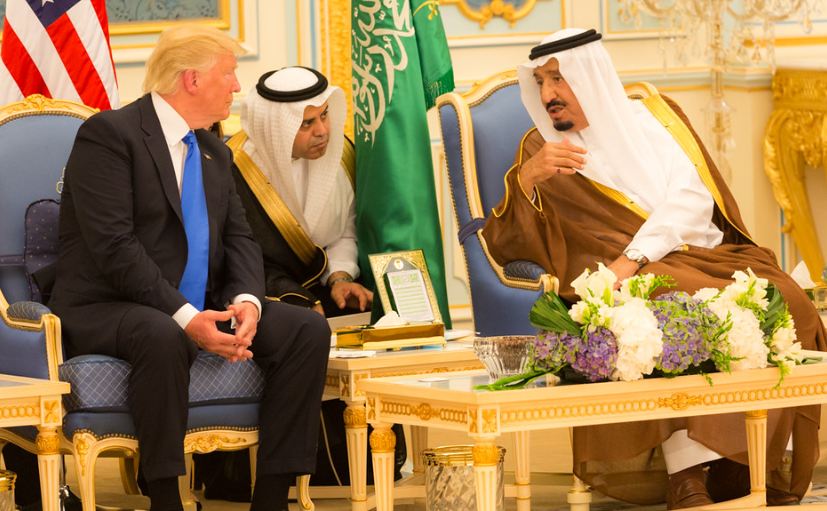President Donald Trump touched down in Riyadh on Tuesday, kicking off a four-day West Asia trip with a red-carpet welcome from Saudi Arabia’s Crown Prince Mohammed bin Salman. Talks are expected to center on Iran, Gaza, energy prices, and U.S. business interests in the Gulf.
The visit marks Trump’s first overseas stop since beginning his second term. And just like in 2017, he’s starting with the Saudis. This time, the stakes may be even higher.
Coffee, Ceremony, and a Clear Message
The reception was unmistakably grand. Saudi F-15 jets escorted Air Force One as it neared the capital. At the airport, Prince Mohammed personally greeted Trump, who was served traditional Arabic coffee in a ceremonial hall by attendants dressed in gun-belts.
There was no mistaking the symbolism here — Saudi Arabia wanted to show the world that Trump remains a valued ally.
What followed was a day packed with optics and influence: a state lunch, high-level business meetings, and a formal dinner at the Royal Court. U.S. business titans like Elon Musk, Stephen Schwarzman, and Larry Fink were all in attendance.

Talks on Iran, Oil, and a War with No End in Sight
Behind the fanfare, heavy topics loomed. Trump and Prince Mohammed dove into discussions around Iran’s nuclear activities, the grinding war in Gaza, and the global oil market — where interests collide.
Trump, eyeing lower energy prices to cool inflation at home, has leaned on OPEC+ to keep production high. It’s worked, for now. Brent crude is sitting at $64.77 a barrel — well below Saudi Arabia’s fiscal break-even point of around $96.
That’s a problem for Riyadh.
Jon Alterman of the Centre for Strategic and International Studies told reporters that this price slump “makes it harder” for Gulf nations to sustain diversification plans. Simply put, cheap oil may help Trump politically, but it strains the very partners he’s visiting.
And then there’s Gaza. The conflict between Israel and Hamas rages on, complicating Trump’s efforts to revive his once-touted Abraham Accords.
Awkward Silence Between Allies
For all the public warmth with Riyadh, Trump’s dealings with Israel have taken an odd turn. He skipped Tel Aviv entirely on this trip — a move that hasn’t gone unnoticed.
Israeli Prime Minister Benjamin Netanyahu was reportedly blindsided by Trump’s recent announcement halting U.S. airstrikes on Yemen’s Houthis. The rebels, backed by Iran, have continued targeting Israeli assets.
Netanyahu wasn’t looped in about the Houthi deal until after it was made public. Same story with Trump’s Hamas talks earlier this year. And when Trump launched nuclear negotiations with Iran last month? Netanyahu found out during a photo op in the Oval Office.
That’s not how allies usually operate.
William Wechsler of the Atlantic Council called the trip itinerary “remarkable,” saying it sends a loud message: “The Gulf governments are, at least for now, stronger friends to Trump than Israel is.”
Trump Organization Projects in the Spotlight
It’s not just geopolitics that brought Trump back to the Gulf. His private business empire is booming there.
Real estate ventures tied to the Trump Organization are underway in all three countries on his itinerary — Saudi Arabia, Qatar, and the United Arab Emirates. That includes:
-
A luxury tower in Jeddah
-
A high-end hotel in Dubai
-
A golf and villa complex in Doha
Critics from across the aisle have raised concerns over potential conflicts of interest, given that Trump’s sons still manage the company. But Trump, never one to shy away from controversy, seems to be doubling down.
Investments, AI, and Missiles
Trump is expected to announce a slew of deals during the trip. Some reports suggest new agreements could involve artificial intelligence, energy cooperation, and advanced arms sales.
Earlier this month, his administration greenlit a $3.5 billion arms deal for Saudi fighter jets. And Saudi officials are expected to commit fresh investments into American infrastructure and tech sectors.
Khalid al-Falih, Saudi Arabia’s investment minister, summed up the mood: “When Saudis and Americans join forces, very good things happen — more often than not, great things happen.”
That kind of optimism may come in handy. With global tensions boiling and alliances shifting, Trump is counting on transactional diplomacy to show results.
No Goodwill Without Progress
Still, there’s one red line the Saudis are drawing: Palestine.
Riyadh hosted Palestinian Vice President Hussein Sheikh last week, signaling that normalization with Israel is off the table — at least for now.
Hussain Abdul-Hussain, a fellow at the Foundation for Defense of Democracies, said the message couldn’t be clearer. “It’s a preemptive, ‘Don’t even think of asking us to show any goodwill toward normalization,’” he said.
Saudi Arabia wants U.S. security guarantees and help with a nuclear energy program, yes. But progress on a Palestinian state is non-negotiable. That’s going to be a tough sell for Trump, especially with Gaza in flames and no ceasefire in sight.
So while the coffee is warm and the palace doors are open, the path ahead is anything but smooth.
